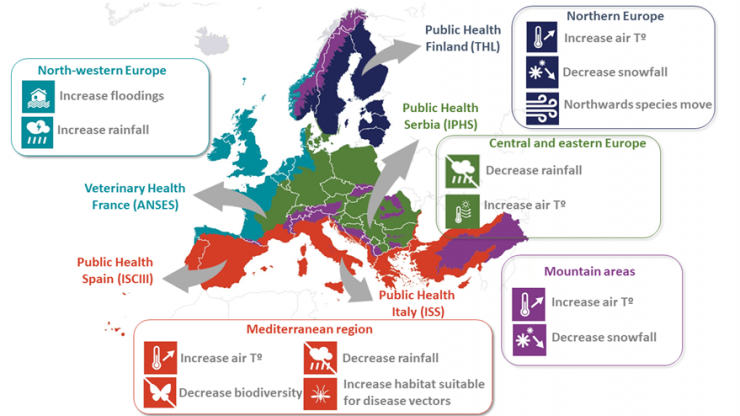Food, Global Health Reading time 5 min
Dealing with emerging diseases: rethinking how we monitor global health
Published on 19 March 2020

What are the risks of a new pathogen in Europe? What are the risks of it spreading? Where is it most likely to spread? These are the preliminary questions that will be addressed by the MOOD project. The project aims to improve epidemic intelligence tools and services, with a strong focus today on COVID-19.
Coordinated by CIRAD as part of the European programme H2020, MOOD is backed by a budget of 14 million euros and brings together 25 partners from 12 countries including research institutions, public health agencies and veterinary services. When the programme concludes at the end of 2023, its participants will have developed new monitoring tools as a complementary addition to those already in existence. These new tools will be shared with all countries.
Faced with the COVID-19 emergency, the MOOD team quickly rolled out specific measures, notably around the modelling of its transmission, early detection of cases and their development. "With the outbreak of COVID-19, we are working twice as hard, while maintaining the trajectory of the initial programme," stresses Renaud Lancelot, a CIRAD researcher and MOOD’s scientific coordinator.
"The exchanges are intense. They are taking place via videoconference until the MOOD launch meeting can be held in Stockholm, as was planned prior to the restrictions relating to COVID-19," says project leader and CIRAD researcher Elena Arsevska.
The Swedish capital was chosen for the official launch of the project because it is home to the headquarters of the European Centre for Disease Control (ECDC). The ECDC is one of MOOD's key partners, along with the WHO (the World Health Organisation), FAO (the Food and Agriculture Organisation of the United Nations) and OIE (the World Organisation for Animal Health).
Unifying and improving health monitoring in Europe and around the world

The MOOD project will come in four stages:
1. Five case studies on epidemic intelligence systems in European countries with different socio-economic statuses, geography, climate and methods of surveillance have already begun. This is focused on Spain, Finland, France, Italy and Serbia;
2. Together with the epidemic intelligence stakeholders in these countries, work will then be carried out to characterise their systems and then jointly assess their needs in terms of epidemic intelligence tools and services;
3. Tools and services will be developed and made available to the ECDC and the public health agencies involved in the project and disseminated in Europe and beyond, particularly in the Global South;
4. Finally, these new co-constructed tools and services will be shared at a reasonable cost and, if possible, be open source.
For four years, research institutions, foundations and government public health and veterinary organisations will work together to unify and improve epidemic intelligence tools and services.
|
Epidemic intelligence systems or how to assess the risk of emerging pathogens With climate change, animal and human mobility, growing populations and urbanisation, there is now an increased risk of the emergence and accelerated global spread of new pathogens. It is crucial that the emergence of a pathogen can be rapidly detected and assessed for the risk it poses to public health: days and sometimes hours can count. In response to this, public health agencies are developing epidemic intelligence systems that rely on two types of information: "official" sources reported by public health services as well as so-called "unofficial" sources, which relay information found in the media, scientific articles or laboratory data. In recent years, systems based on unofficial sources have proved particularly effective in detecting the emergence of new diseases by exploiting, for example, data from internet forums, online press articles and even social media. However, this requires the processing of huge amounts of data. How can we spot the early warning signs among all this information? How can they be prioritised? How can we interpret them? How can we assess the risk of a new pathogen spreading? It is hoped MOOD will help answer these questions by providing existing monitoring platforms with methodological and practical support in response to their needs. Beyond health data, other types of data will also be incorporated to better assess the risk of a pathogen spreading. This could include information on climate, migration, land use and even deforestation. |
* Partners in the MOOD project
France : Anses, Cirad, INRAE, Inserm, Université de Montpellier, GERDAL
Allemagne : Mundialis GmbH & Co KG
Belgique : University of Antwerp, Université Libre de Bruxelles, Katolich University of Leuven, AVIA-GIS
Espagne : Instituto de Salud Carlos III
Italie : Fondazione Edmund Mach, Istituto Superiore di Sanita
Finlande : National Institute for Health and Welfare
Pays-Bas : Stichting OpenGeoHub
Portugal : Université de Lisbonne
Royaume-Uni : Environmental Research Group Oxford, University of Southampton
Serbie : Institute of Public Health of Serbia
Suisse : ETH Zürich, Swiss Institute of Bioinformatics
Etats-Unis : International Society for Infectious Diseases Incorporated

|
This project has received funding from the European Union’s Horizon 2020 research and innovation programme under grant agreement n° 874850 - MOOD |
